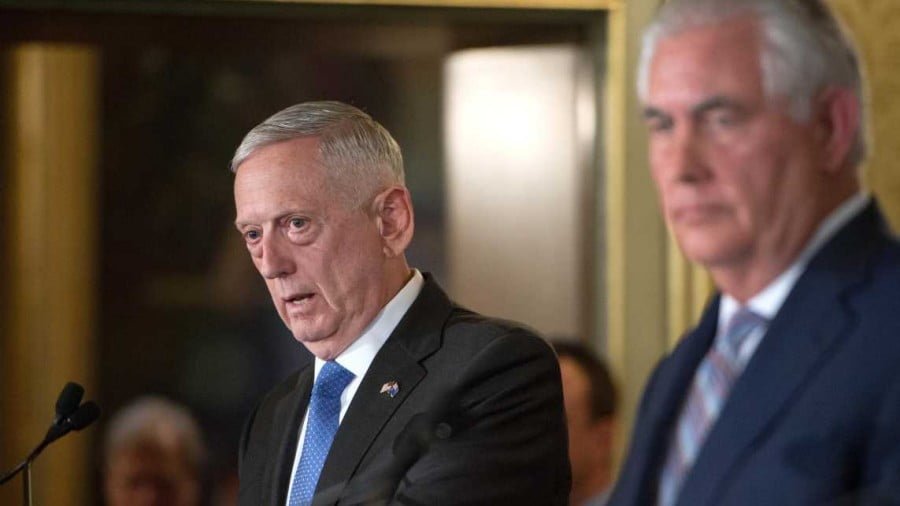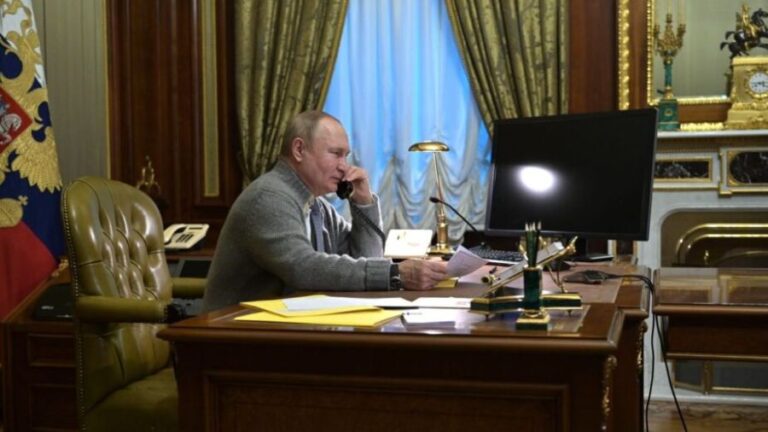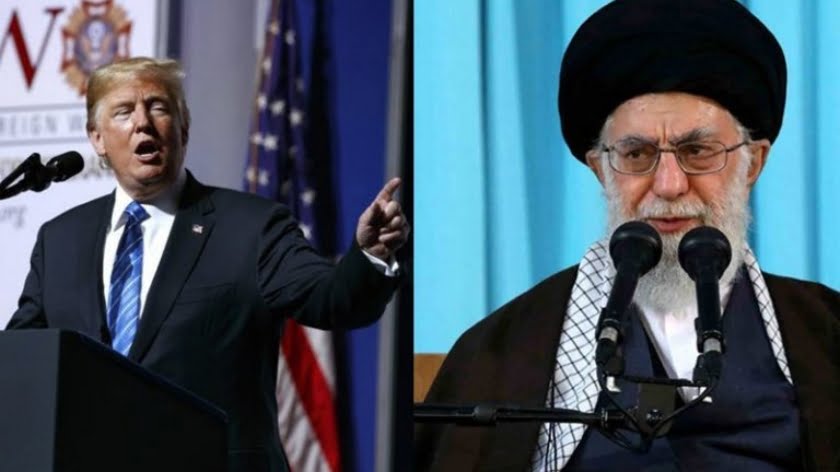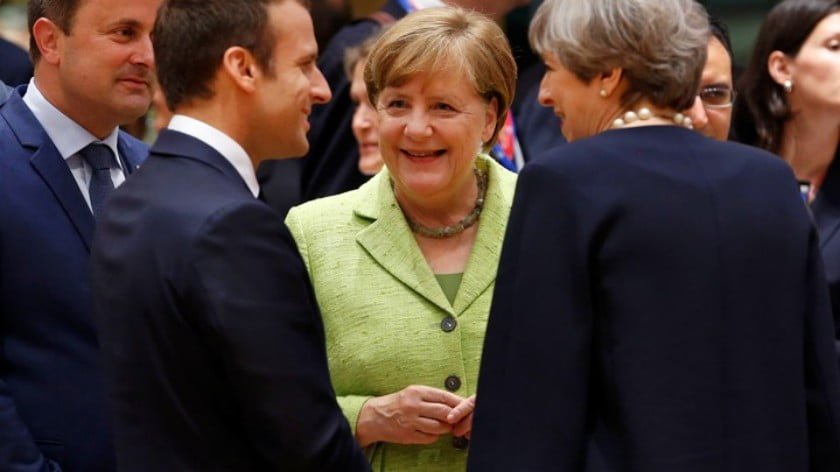Trump Offloads Foreign Policy Problems – Lets EU Grow a Spine
The U.S. is more and more isolated in international politics and even Europe is growing some spine and implements an independent foreign policy. U.S. imperialists are miffed but can do little about it. This development may well be part of Trump’s plan of “Making America Great Again”.
After Trump declared that the U.S. sees Jerusalem as Israel’s capital the UN Security Council as well as the UN General Assembly condemned the move. The U.S. had to veto a UNSC resolution that 14 other members supported.
While the minor protests and riots in Iran, are calming down (as predicted here), the U.S. ambassador Haley tried to use them to stage some UNSC verdict against the country. She was rebuffed by several countries including the U.S. allies France and Sweden.
A United Nations Security Council meeting on Friday to discuss recent protests in Iran turned into criticism of the United States for requesting to meet on what some member states said was an internal issue for Tehran.
The EU spoke out against any condemnation of Iran. Russia and China repeated Iran’s arguments that such internal issues have no place in the UNSC and that a string of much worse riots and police massacres in the U.S. would be more deserving of such attention:
China and Russia — which seldom like to discuss political protests at the UN — led a group of countries that said the demonstrations were a domestic affair that didn’t threaten international security and shouldn’t be taken up. China’s envoy said that if Haley’s logic were to be followed consistently, the Security Council should have held hearings after the 2014 racial protests in Ferguson, Missouri, and the Occupy Wall Street demonstrations in 2011.
France spoke for the EU:
“We must be wary of any attempts to exploit this crisis for personal ends, which would have the diametrically opposed outcome to that which is wished,” Ambassador Francois Delattre said.
“However worrying the events of the last few days in Iran may be, they do not constitute per se a threat to international peace and security.”
This was a repeat of the fear that President Macron expressed two days ago and which we quoted here. Even U.S. media are now taking note of it:
“The official line pursued by the United States, Israel and Saudi Arabia, who are our allies in many ways, is almost one that would lead us to war,” Macron told reporters, according to Reuters.
It was “a deliberate strategy for some,” he added.
The U.S. attempt to use protests against neoliberal policies of the Rohani government as a step to regime change in Iran has evidently failed.
Trump has threatened to end the nuclear agreement with Iran but his administration is wary of the consequences. The agreement is between a number of countries, not the U.S. and Iran alone, and the UNSC has endorsed it. But Trump also loathes to certify Iran’s adherence to the agreement every three month. It keeps the issue boiling and he has no interest in that. The certification is a condition the Republicans in the U.S. Congress had written into law. Trump’s solution is not to kill the nuclear agreement but to change the law to relief him of the certification demand:
The Trump administration is working with key lawmakers on a legislative fix that could enable the United States to remain in the Iran nuclear deal, Secretary of State Rex Tillerson said in an interview with The Associated Press on Friday.
The changes to the U.S. law codifying America’s participation the 2015 agreement could come as early as next week or shortly thereafter, Tillerson said. President Donald Trump faces a series of deadlines in the coming days about how to proceed with an accord he describes as terrible and too soft on Iran.
…
“The president said he is either going to fix it or cancel it,” Tillerson told the AP as he sat in front of a fireplace in his State Department office suite. “We are in the process of trying to deliver on the promise he made to fix it.”
Trump and Congress have no power to change an international agreement. So what would that “fix” be?
One option lawmakers are discussing with the White House is removing the requirement that Trump certify Iranian compliance. Another possibility is changing the law so certification occurs far less often, officials said.
If this is really all that is needed to get Trump off the anti-Iran train it neatly fits the “isolationist” theory discussed below.
But back to the EU position. Trump has reversed a U.S. opening to Cuba but the EU is not following its move. The EU foreign policy chief is currently in Cuba and rejecting the U.S. stance:
The European Union wants to be a reliable partner for Cuba in the face of the reversal in U.S.-Cuban relations under President Donald Trump, its foreign policy and security chief said Thursday.
Federica Mogherini said at the end of a two-day visit that the EU is a “predictable and solid” partner that can help Cuba manage a political transition and slow, halting economic opening.
…
“We are consistent and we do not have unpredictability in our policies, or sudden shifts,” Mogherini said, in a clear dig at Trump’s reversal of some elements of President Barack Obama’s opening with Cuba.
After Jerusalem and Iran, Cuba is the third foreign policy issue on which the European Union is setting itself in opposition to the United States. After years of lockstep with U.S. policies the change is a pleasant surprise. Two more issue are likely to follow – Syria and Russia. With the German chancellor Merkel still busy to find a domestic coalition to renew her rule, the French president Macron is taking the lead when he now echos what the Syrian president Assad has been saying for 7 years:
Ce n'est ni à Ankara ni à Paris qu'on décidera de l'avenir de la Syrie. Le peuple syrien, y compris ceux qui ont fui le régime, devra lui-même décider de son avenir.
— Emmanuel Macron (@EmmanuelMacron) January 5, 2018
Poland was one of the parties which had strongly pressed for regime change in Ukraine. It got its wish fulfilled but now finds that the new Ukrainian rulers are elevating those fascist groups and people who historically were responsible for massacring ten-thousands of Poles. Oops. The sanctions on Russia over the situation in Ukraine and Crimea have cost Germany huge export opportunities. The combination of both of these factors will likely lead to a change in the EU policy towards Russia. While the U.S. delivers new weapons to the Ukraine I predict that the EU will lower its exposure to the issue. Its sanctions against Russia will be eased or circumvented.
The imperial think-tanks in the U.S. are not happy with an independent EU. Here are voices of Brookings, the premier “centrist” lobby and influence peddler, and of the Washington Institute, part of the Zionist lobby:
This is a huge missed opportunity for Europe, both to use their diplomatic & economic leverage for the long-term good of Iran & to demonstrate the possibility and even utility of making common cause with Washington on Iran https://t.co/6QnwkKjFz8
— Suzanne Maloney (@MaloneySuzanne) January 4, 2018
https://twitter.com/MichaelSinghDC/status/948996016208039936
Brookings on Cuba:
A real moral failing here. Okay to engage Cuba but should pressure regime to liberalize. Combined with "both sides-ism" on Iran, it's been a terrible week for European foreign policy. https://t.co/sxADkRlmee
— Tom Wright (@thomaswright08) January 5, 2018
The Europeans may judge that differently.
Trump made loud noise towards North Korea and even boosted that his dick is bigger than Kim Jong-un’s schlong. But when North Korea offered a quiet period for the Winter Olympics in South Korea and renewed talks, Trump agreed with the peace seeking South Korean president Moon to let him take up the offer.
Patrick Armstrong and Andrew Korybko see a method behind these developments. Armstrong: Trump Cuts the Gordian Knot of Foreign Entanglements
Trump has little interest in the obsessions of the neocon and humanitarian intervention crowd.
…
President Trump can avoid new entanglements but he has inherited so many and they are, all of them, growing denser and thicker by the minute. Consider the famous story of the Gordian Knot: rather than trying to untie the fabulously complicated knot, Alexander drew his sword and cut it. How can Trump cut The Gordian Knot of American imperial entanglements?
By getting others to untie it.
Armstrong, a former Canadian defense official and Russia specialist, thinks that Trump is taking his extreme positions only to press others to take over and let Trump and the U.S. leave the issue aside. If the EU takes up the Iran issue or Cuba, if Russia engages in the Middle East “peace process” and if South Korea handles the North Korea problem, Trump will be fine with it. There nothing to win in those issues for his core agenda.
Korybko’s piece, Trump: Agent Of Chaos (a.k.a. “The Kraken”), presumes that Trump is deliberately creating chaos to better the U.S. position. There is a high chance that this will not work and the U.S. will have to retreat to its hemisphere. Trump knows this but does not care – he can live with both outcomes but may even prefer the retreat to a more isolationist stand.
I do not believe that Trump is as stupid as his enemies portrait him. Trump simply does not explain what he is doing. He is letting everyone guessing, even his own staff. One has to watch what he does, not what he says.
Trump does not care about many foreign issues where the Clinton, Bush and Obama administrations were the first to meddle. In his view the various adventures abroad to not further U.S. core interests. If other countries can be pushed into taking these up, the U.S. can leave the issues aside. His position is the opposite of what the usual Washington grown-ups are used to do. They are fighting him down to tooth and nail.
Will Trump survive long enough to successfully pursue this strategy and to make a lasting difference?
Or is the Armstrong/Korybko theory completely wrong?
Source: Moon of Alabama







